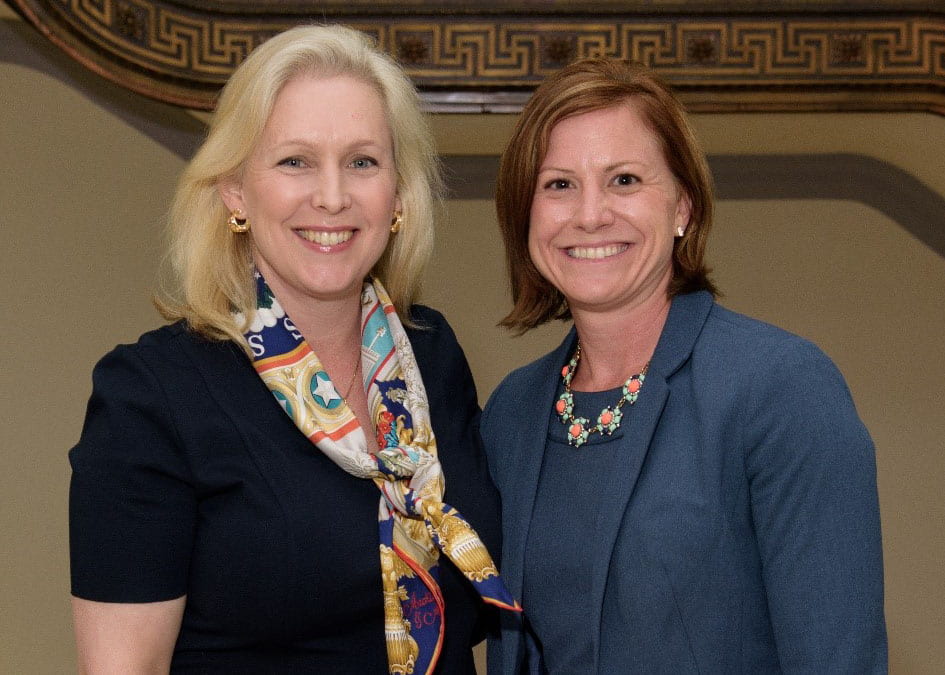Written by Sarah Moreland-Russell, assistant professor at the Brown School
I recently returned to Washington University after a yearlong stint as the American Public Health Association’s Public Health Fellow in Government in Washington D.C. While there, I worked as congressional staff for Sen. Kirsten Gillibrand (D-New York). This fellowship offered a chance-of-a-lifetime opportunity to work directly on federal policymaking. While challenging, scary, and sometimes even comical, this experience was incredibly valuable for three reasons – because all good things come in threes.

May 2016.
First, I was afforded the opportunity not only to help determine effective policy strategies for improving public health practice and programming, but to write and advocate for legislation—turning my policy ideas from abstract concepts into real policy.
Alarmed? You should be.
I have formal training in public health and public policy and over 15 years of experience working in public health settings including academia, non-for-profit organizations, and health departments. While my experience is wide ranging, and I engaged in some component of policy making in each of my previous positions, I was in no way equipped to write federal policy or effectively participate in the policy making process. I was not alone – most staff on the Hill are writing federal policy and often have no clear understanding what they are writing the policy for or do not have access to evidence-based resources.
Hill staff get their policy ideas from stakeholders – some ideas are good, but most are not. Therefore, Hill staff are constantly seeking help – either in the form of data to understand the true problem at hand, general expertise to guide discussion, objective insight, or real world experiences in designing rules for implementation. Hill staff often commented about how public health expertise is valued and needed to ensure that policy ideas are transformed into legislation that addresses a problem and implemented without unintended consequences, yet this expertise is often absent from the process.
This brings me to my next point. Because I had to write legislation and then try and convince others of the quality of my policy idea, I gained important and valuable insight into politics and the policy process. I learned mechanisms for effectively engaging stakeholders and garnering attention from policymakers.
Was this experience frustrating? Yes.
Did I often fail to overcome the politics surrounding a specific issue? Yes.
Was the work important enough to keep trying? Absolutely!
This does not mean that all public health and social work professionals need to become politically savvy – there are political strategists and government relations staff for that.
It does mean that we need to build our communication skills. It means that we cannot use p values and odds ratios to communicate the significance of our work. It also means that we cannot choose academic publication as the only form disseminating important research results. Hill staff do not have access to these journals. In fact, while on the Hill, I was the only staffer with access to many of the journals which publish important public health and social policy research.
If we are going to have meaningful impact, we must be more astute in navigating the field of policy and politics and effectively engage and communicate with decision makers by using non-technical and easily accessible dissemination methods.
The final reward of my fellowship is the potential for me to turn this experience into an opportunity for other public health and social work professionals to more actively participate in the policy process. In my new role as the Clark Fox Senior Scholar at the Brown School, I am collaborating with Policy Institute leadership and other policy faculty to design programming, coursework, and practical experiences that will help build the capacity of students to engage in all stages of the policy process – from policy development to evaluation.
I have recently published an article, Policy Help Needed, Experience Required, outlining the strengths and skills that support public health practitioners’ ability to conduct policy work and recommendations for curricula to integrate policy-related coursework or practical experiences to prepare practitioners for policy careers. I will also work with faculty and other staff in the academy to effectively engage with decision makers, elevate their important research, and lend objective expertise to determine innovative policy strategies for addressing complicated public health and social welfare issues.
In sum, the three main take home messages include:
- Policymakers and their staff need resources and expertise to write well-developed, evidence-based legislation – but often don’t have easy access to them.
- You don’t need to be a political strategist or lobbyist to engage in the policy process. If you have the will, there is a way.
- Public health and social work professionals must enhance their skills, knowledge and overall comfort in participating in the policy process.
I hope I have at least sparked interest for further discussion. If this election is any indication, politics and policy can be ugly, messy, and uncomfortable. That said, there is great potential and need for public health and social work professionals to be active participants in, and contributors to, the political process.